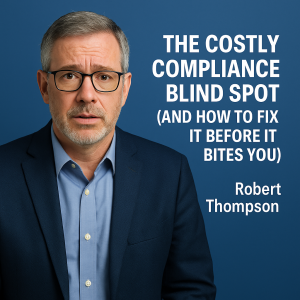Let’s be honest — when you hear the word compliance, you probably think it’s a problem for the big guys. Fortune 500. Multinationals. Not your local accounting firm with a tight crew and loyal client base.
But here’s the reality in 2025: compliance isn’t optional, and it’s no longer just “corporate” territory. If your firm handles client data (and you do), processes credit cards (yep), or deals with any kind of financial or health info — then you're on the radar.
And the price for getting it wrong? It’s not just a slap on the wrist. It’s financial pain, reputational damage, and sleepless nights.

Cost of Non-Compliance
Why This Matters to You — Right Now
Regulators like the FTC, PCI SSC, and even HIPAA (yes, even if you’re not a hospital) are cracking down. They’re holding everyone to higher standards. Small firms. Mid-sized firms. Anyone handling sensitive data.
In fact, a small clinic got hit with a $1.5 million fine last year for skipping basic data protections. That’s not a typo. And that could just as easily have been your firm — especially during tax season when systems are strained and vulnerabilities show up.
Let’s take a quick look at the big three compliance hot zones:
1. HIPAA
If your firm deals with financials for any medical practice or handles PHI — you’re in HIPAA territory. That means:
- Encrypting all electronic health info
- Doing regular risk assessments
- Training staff on privacy rules
- Having a plan ready for breaches
Think of it as a checklist that protects your firm from disaster. Skip it, and you’re gambling with serious fines.
2. PCI DSS
Process credit cards? You need to comply with PCI DSS. That means:
- Securely storing card data
- Monitoring your network for threats
- Locking down access to sensitive info
- Encrypting everything that moves
Ignore it and you’re risking fines of up to $100K per month — plus higher transaction fees and lost trust from clients.
3. FTC Safeguards Rule
Collect financial info from clients? (Of course you do.) The FTC wants you to:
- Create a written security plan
- Appoint someone responsible for it
- Use multi-factor authentication (MFA)
- Audit your tech regularly
Miss one step, and you’re looking at up to $100K per incident. That’s per breach, per rule violation — and it doesn’t even count legal fees or client churn.
A Real Story, Real Damage
I know a small Toronto practice that got hit with ransomware last year. They didn’t even know their backup system had failed. Took two days to get servers back. That cost them $250K in fines — but the real damage was losing two long-term clients who no longer felt safe.
That kind of hit isn’t just financial — it’s personal.
What You Can Do (Starting Today)
Here’s how to protect your firm:
- Run a Risk Assessment: Know where you’re exposed before someone else finds out for you.
- Lock Down Your Data: Firewalls, MFA, encrypted backups — the whole nine yards.
- Train Your Team: One bad click can tank your entire reputation.
- Build an Incident Plan: When something goes wrong (not if), what’s your move?
- Work With Experts: Don’t guess your way through this. Find people who know compliance cold.
Bottom Line: This Isn’t Just IT — It’s Your Reputation
You’ve worked hard to build a firm that clients trust. Don’t let a compliance blind spot undo all of that. You don’t have to be a tech expert. You just need the right partner to help you sleep at night.
That’s why we offer a FREE Network Assessment — no strings attached. We’ll show you exactly where the gaps are and what to do next.
Click here to book yours now.
Let’s fix the blind spots before they cost you thousands.
—
Robert Thompson
Tech Fuel
--> Helping GTA accounting firms stay secure, compliant, and stress-free.


